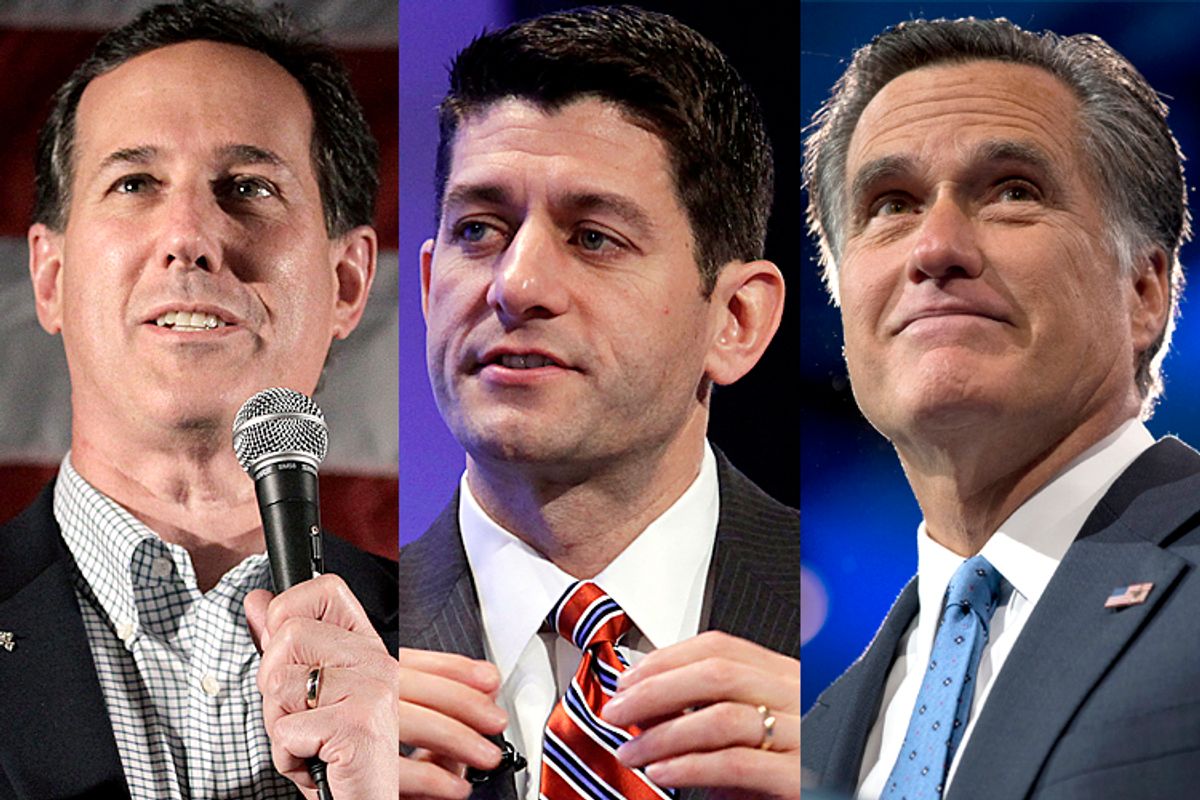For the last 15 years, the Harvard Institute of Politics has been conducting periodic, broad opinion polls on the political and cultural views of young Americans. The latest poll, released to the public on Tuesday, largely reaffirms the picture that's been painted of this emerging generation: millennials are largely uninterested in religion, deeply disillusioned with politics, and while they're considerably more liberal than the general public, younger millennials (aged 18-24) seem to be trending less liberal than their older peers. So far, so good. But then the pollsters asked young people whether they expected to vote in the upcoming midterm elections, and they discovered something surprising.
The millennials who expect to vote in the upcoming election tend to trend conservative, with 44 percent of respondents who voted for Mitt Romney in 2012 saying they would be "definitely voting," next November, compared to just 35 percent of those who voted for President Obama. (Overall, only one in four millennials said that they expect to vote, a slightly lower percentage than at the same point in the past two midterm cycles.)
This might be disheartening to Democratic partisans, and will do nothing to stem the tide of criticism directed at millennials from boomers across the nation. After all, this revelation seems to confirm some of the most stubborn accusations about Gen Y's triviality and fecklessness. Millennials love to complain about the world, so why can't they be bothered to register their disappointment with their vote, throwing out the bums when given the chance? What gives?
Let me try to explain. Most young Americans are disillusioned with politics, yes, but in their defense, our politics today is deeply disillusioning. A choice between a milquetoast, pro-business socially liberal candidate and a firebrand pro-business social conservative is really no choice at all. (And I'm hardly the first to say it.) Furthermore, the extremism on the right means that even "wave" elections for progressives can be thwarted by a Republican Party that's more than happy to abuse our system's robust protections of minority party rights to prevent any and all Democratic initiatives, as illustrated in the dishearteningly short Democratic near-super majority of 20o8-2010. (Thanks, Massachusetts.)
In this environment, even initiatives with broad bipartisan voter support are likely to face near total Republican opposition. When combined with the inherent geographic disadvantage that Democrats face, the Republican Party's capacity to gum up the legislative works is unlikely to diminish in the foreseeable future. Do you happen to know any liberal millennials planning to move to rural Georgia? Me neither.
If our political parties want to better engage millennials, party leadership on both the left and the right need to support candidates who are willing to earn their enthusiasm; we need candidates willing to acknowledge the enormity of the challenges that young Americans face. Unsurprisingly, when politicians opt to go this route, they attract huge support among millennials, often able to leverage this support into surprising, landslide victories. Regardless of what you think of their politics or respective records, Elizabeth Warren, and, to a lesser degree, Bill de Blasio provide a clear template for politicians who hope to engage America's most apolitical generation.
Millennial cynicism is deeply rooted in their generation's perspective: Millennials have lived most of their lives within a historically toxic partisan climate -- for many, it's the only kind of politics they've ever known. Without a compelling reason to expect this to change any time soon, young people are opting to disengage from politics entirely: Can you really blame them?
Meanwhile, despite (or perhaps because of) declining ad revenue, news media is a huge, quickly changing business, contorted by a set of perverse incentives that only serve to promote our polarized culture's worst impulses. In the media landscape of 2014, practically anything is fair game: trolling your ideological opponents, making inflammatory, unsubstantiated claims, or simply discussing hot-button issues that reliably kick up dust -- whatever it takes to build "engagement" and drive eyeballs. (And I'm certainly not innocent in this regard.)
So let's review: combine a fractured, vitriolic political discourse with often indistinguishable candidates, and an entrenched Republican Party populated almost entirely by irrational extremists willing to cut America's nose just to spite her face.
Are these really the politics that millennials are expected to engage in enthusiastically -- and uncritically?
Heaven forbid our political parties consider why millennials are disengaged, or -- gasp! -- try something new like crafting policy platforms that address this generation's concerns. (Does anyone have a real plan to solve the college affordability crisis?)
But why bother? Our two-party system is perfectly suited to keep the status quo intact: Candidates freely exploit young Americans as free labor (i.e., "volunteers") come election season, only to forget about them -- and their policy preferences -- as soon as the voting booths close.
As a long-term political strategy, this might be suicidal -- but in the here and now? It makes perfect sense.

Shares